Type 2 Diabetes
Our program offers everything you need to manage type 2 diabetes and feel your best. From nutritional support and insulin to more complex care, we can help.
Medically reviewed by Deborah Plante, M.D. on Nov. 28, 2023.
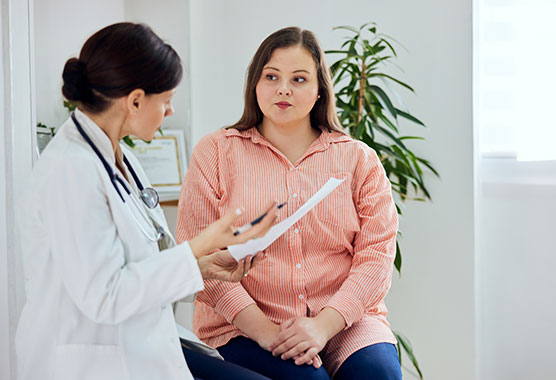
What Is Type 2 Diabetes?
Nearly 38 million people in the U.S. have type 2 diabetes, and millions more are at risk of getting it. This condition causes chronic (long-term) high blood sugar, which can damage your organs and body systems. Uncontrolled diabetes can lead to heart disease, stroke, vision loss and limb loss.
At UC Davis Health, you receive compassionate, leading-edge care for type 2 diabetes. U.S. News & World Report ranks our diabetes care among the top programs in the nation.
Type 2 Diabetes Symptoms
Many people have type 2 diabetes and don’t know it. They may not have symptoms, or the symptoms are so mild they don’t notice them.
If you have any symptoms of type 2 diabetes — even if they are not severe — contact your health care provider. The sooner you receive treatment for diabetes, the better your long-term health can be.
Common Symptoms
Type 2 diabetes symptoms develop slowly, over several years, making them hard to spot. Watch for:
- Blurry vision
- Fatigue
- Increased hunger or thirst
- Numbness or tingling in your hands or feet
- Sores that do not heal
- Urinating more often
Emergency Symptoms
Type 2 diabetes can cause life-threatening complications, including diabetic ketoacidosis (DKA). If you experience symptoms of DKA, seek emergency medical care.
- Confusion or inability to concentrate
- Dry mouth
- Extreme thirst
- Extreme fatigue or weakness
- Flushed skin
- Fruity-smelling breath
- Nausea and vomiting
- Rapid breathing
Causes and Risk Factors of Type 2 Diabetes
To understand type 2 diabetes, you need to know how blood glucose (blood sugar) and insulin normally work:
- After you eat or drink sugar or carbohydrates, glucose travels to your blood, causing your blood glucose levels to rise.
- Your pancreas (a gland in your abdomen) releases insulin, a hormone that moves glucose from your blood to your cells. Once in your cells, your body can use it as energy.
- Your cells recognize the insulin and respond by pulling glucose from your blood.
- Your blood glucose drops, and your pancreas stops releasing insulin.
Type 2 diabetes occurs when one of these situations happens:
- Your cells stop responding to the insulin you have (insulin resistance).
- Your pancreas cannot make enough insulin to keep up with your blood glucose levels.
Without insulin working in your cells, glucose cannot move out of your blood. Your cells don't get the energy they need, and your blood glucose remains too high.
Learn more about insulin resistance
Anyone can develop type 2 diabetes. However, if you have one or more of these risk factors, you are more likely to develop the condition:
Age
People over age 45 get type 2 diabetes more than younger people. However, children and young adults can develop it, too.
Body Weight
People who are overweight or obese have a higher risk of developing type 2 diabetes. The risk may be even higher in people who have excess fat around the abdomen (belly).
Family History
Type 2 diabetes can run in families. If a parent or sibling has the condition, there’s a higher chance you will develop it, too.
Health Conditions
Heart disease , high blood pressure , high cholesterol, polycystic ovary syndrome (PCOS) and sleep apnea can increase your risk of getting type 2 diabetes.
Physical Inactivity
People who do not exercise at least three times each week have a higher risk of developing type 2 diabetes.
Race and Ethnicity
Type 2 diabetes affects African Americans, Asian Americans and Hispanic or Latino people more often than people of other races.
Diagnosing Type 2 Diabetes
Our diabetes program includes experienced specialists who provide accurate, timely diagnoses. We take the time to explain which tests you may need and what the results mean for your health.
Diagnosing type 2 diabetes requires one or more blood tests. These tests may include:
A1C test
This test measures your average blood sugar over the past three months. An A1C test looks at your hemoglobin, a protein in your blood that binds with glucose. People with prediabetes or type 2 diabetes have more glucose attached to their hemoglobin than people without these conditions.
Fasting blood sugar test
This test checks your blood sugar after not eating or drinking (except water) for eight to 12 hours.
Glucose tolerance test
For this test, your provider measures your blood sugar before and after you drink a sugary liquid.
Random glucose test
This test checks your blood sugar without fasting or any special preparation.
Type 2 Diabetes Treatments at UC Davis Health
At UC Davis Health, we are ranked among the top programs in the country for diabetes and endocrinology (medical field that specializes in diabetes care). Our diabetes clinics include teams of experts who work together to create comprehensive diabetes plans.
You have access to every specialist you need, from internal medicine physicians and endocrinologists to nutritionists, cardiologists and ophthalmologists. With the right care, you can live a long, healthy life with type 2 diabetes.
Blood Glucose Monitoring
We offer the latest glucose meters and continuous glucose monitors (CGMs) for accurate blood glucose measurements. We walk you through how to use your device and how often to check your glucose.
Diabetes Education
You have access to diabetes support and resources like health education classes and support groups. In them, you learn about diabetes and connect with others who understand the condition.
Medications
Some people need to take insulin to manage type 2 diabetes. Our providers find the best option for you, from injections (shots) to pumps that provide continuous insulin throughout the day.
Nutritional Counseling
Our registered dietitians specialize in caring for people with type 2 diabetes. We work with you to develop a diet plan that fits your lifestyle and preferences.
Preventing Type 2 Diabetes
Diabetes is a leading cause of disability and death in the U.S., but it is preventable.
About 96 million U.S. adults have prediabetes. Prediabetes is when your blood sugar is higher than normal, but not high enough to be diagnosed with diabetes. About 80% of people with prediabetes don’t know they have it.
Whether you have prediabetes or diabetes risk factors, you can prevent or delay type 2 diabetes if you:
Cut liquid calories
Drink water instead of soda, juice or other sweetened drinks.
Eat more healthy foods
Focus on fruits and vegetables instead of processed foods like crackers, chips and desserts.
Exercise more
Try walking or doing another physical activity you enjoy. Getting 30 minutes of movement, 5 days a week, lowers your type 2 diabetes risk.
Lose weight
Losing 5% to 7% of your body weight can prevent diabetes. You may be able to lose this amount by making diet changes and moving more. Talk to your health care provider if you need help creating a weight loss plan that works for you.
At UC Davis Health, we help you prevent type 2 diabetes through science-backed diet and exercise guidance. Our providers are here to help you establish health goals that benefit you now and for years to come.
We also offer diabetes prevention classes that empower you to take charge of your well-being. Learn more about our Preventing Diabetes Living Healthy class.
Explore healthy lifestyle habits to help you prevent or manage type 2 diabetes
"National Diabetes Statistics Report," Centers for Disease Control and Prevention (CDC), https://www.cdc.gov/diabetes/data/statistics-report/index.html
"Hispanic or Latino People and Type 2 Diabetes," CDC, https://www.cdc.gov/diabetes/library/features/hispanic-diabetes.html
Request an Appointment
As Sacramento's No. 1 hospital, you'll benefit from unique advantages in primary care and specialty care. This includes prevention, diagnosis and treatment options from experts in 150 specialties.
Referring Physicians
To refer a patient, submit an electronic referral form or call.
800-4-UCDAVIS
Patients
Call to make an appointment.
Consumer Resource Center
800-2-UCDAVIS
We offer diabetes diagnosis and treatment at four of our clinics throughout the Sacramento region.
-
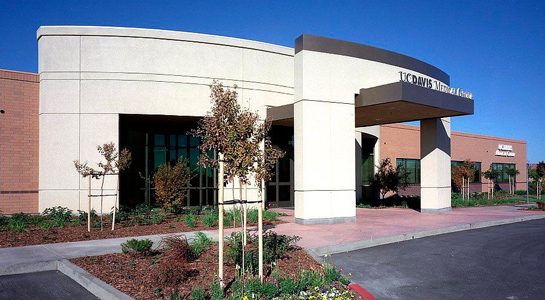
Elk Grove
See more clinic informationarrow_forwardlocation_on 8110 Laguna Blvd., Elk Grove, CA 95758
call 916-683-3955
-
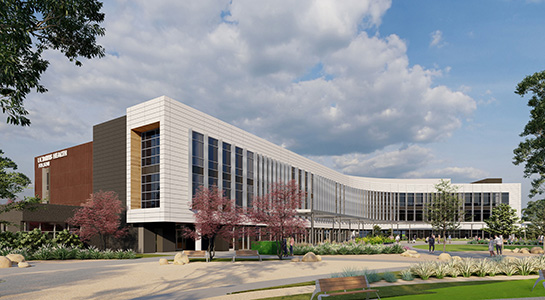
Folsom
See more clinic informationarrow_forwardlocation_on 14264 Innovation Drive, Folsom, CA 95630
call 916-946-1700
-
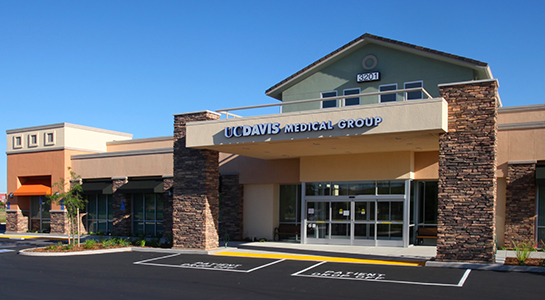
Rancho Cordova
See more clinic informationarrow_forwardlocation_on 3201 Data Drive, Rancho Cordova, CA 95670
call 916-851-1440
-
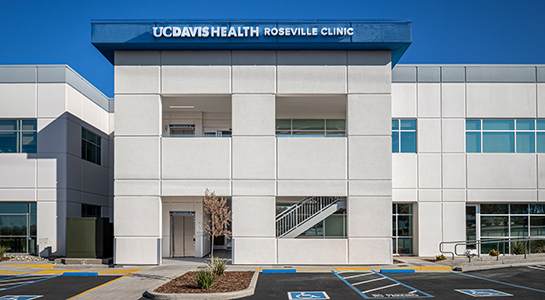
Roseville
See more clinic informationarrow_forwardlocation_on 1620 E. Roseville Pkwy., Roseville, CA 95661
call 916‑783‑7109

Ranked among the nation’s best hospitals
A U.S. News & World Report best hospital in cardiology, heart & vascular surgery, diabetes & endocrinology, ENT, geriatrics, neurology & neurosurgery, and pulmonology & lung surgery.

Ranked among the nation’s best children’s hospitals
U.S. News & World Report ranked UC Davis Children’s Hospital among the best in pediatric nephrology, orthopedics*, and pulmonology & lung surgery. (*Together with Shriners Children’s Northern California)

Ranked Sacramento’s #1 hospital
Ranked Sacramento’s #1 hospital by U.S. News, and high-performing in aortic valve surgery, back surgery (spinal fusion), COPD, colon cancer surgery, diabetes, gynecological cancer surgery, heart arrhythmia, heart failure, kidney failure, leukemia, lymphoma & myeloma, lung cancer surgery, pacemaker implantation, pneumonia, prostate cancer surgery, stroke, TAVR, cancer, orthopedics, gastroenterology & GI surgery, and urology.

The nation’s highest nursing honor
UC Davis Medical Center has received Magnet® recognition, the nation’s highest honor for nursing excellence.

World-class cancer care
One of ~59 U.S. cancer centers designated “comprehensive” by the National Cancer Institute.

A leader in health care equality
For the 13th consecutive year, UC Davis Medical Center has been recognized as an LGBTQ+ Healthcare Equality Leader by the educational arm of America’s largest civil rights organization.

